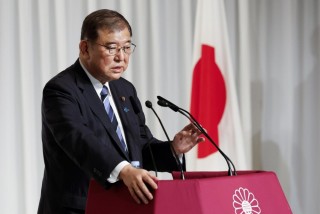Loading
Search
▼ Ishiba Wary Of Pre-Election Inflation-Fighting Consumption Tax Cut
- Category:Other
Prime Minister Shigeru Ishiba expressed caution about a consumption tax cut as an inflation relief step on Sunday, suggesting such a reduction in tax revenue would cause a serious drain on state coffers.
Senior officials of his administration and ruling Liberal Democratic Party have been dismissive of a cut in the consumption tax -- at 8 percent for food and beverages and 10 percent for other items -- as the coalition government looks to put together an economic package ahead of the House of Councillors election this summer.
"We need thorough discussions on whether there are other ways to support people truly in need of help," Ishiba said while appearing on a Fuji Television program.
Cutting the consumption tax rate "would raise a question about the impact on the country's finances," he said.
With opposition parties converging in support of a consumption tax cut ahead of the election, there has been debate between senior government officials and pro-tax cut members of the LDP and its coalition partner Komeito party.
The major opposition Constitutional Democratic Party of Japan has proposed a pause on the consumption tax on food for one year.
As for tariff negotiations with the United States, Ishiba said his government will continue to seek a complete abolition of additional duties on Japanese exports.
Commenting on the U.S.-British agreement that set tariffs on most British exports, including cars, entering the U.S. market at 10 percent, Ishiba said, "It could serve as a model (for other countries), but we are looking for (tariffs) to be abolished."
Their agreement "doesn't mean a 10 percent rate would be acceptable for us," he added.
U.S. President Donald Trump, who has raised the tariff on imported cars to 27.5 percent from 2.5 percent, agreed to lower it to 10 percent for a maximum of 100,000 British cars per year, while the average British import duty on U.S. goods will fall to 1.8 percent from 5.1 percent.
In addition to the higher tariff on Japanese cars and a 25 percent levy on steel and aluminum, the United States has imposed a 14 percent tariff on other Japanese products on top of the baseline 10 percent duty.
While the 90-day suspension on the 14 percent country-specific tariff is expected to end in early July, "The fact that we have a deadline coming up would not necessarily be a reason for us to make compromises and accept disadvantages," Ishiba said.
The Trump administration has pushed Japan to buy more American cars and agricultural products.
Among American crops Japan buys, Ishiba said there is room for an increase in corn imports to boost biofuel production.
"We will not sacrifice farm products for cars," he said.
- May 11, 2025
- Comment (0)
- Trackback(0)


